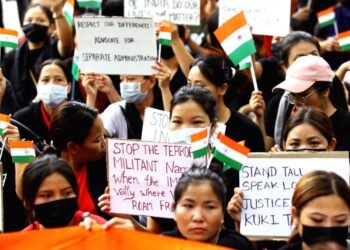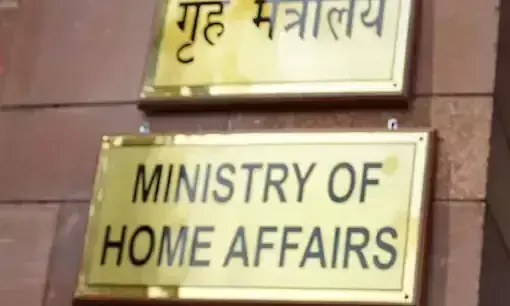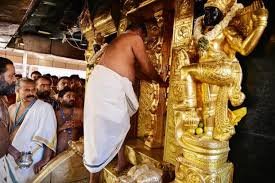History shows “territorial integrity” is no guarantee—Bihar twice rejected Jharkhand’s creation, yet the state was carved out in 2000 when politics shifted.
BY Navin Upadhyay
September 4, 2025 – In what many view as a tactical victory, the Kuki-Zo leadership has secured a one-year extension of the Suspension of Operations (SoO) agreement with the Ministry of Home Affairs (MHA). The pact once again repeats the boilerplate clause on safeguarding Manipur’s territorial integrity, but for the first time, it explicitly records Delhi’s willingness to explore the Kuki-Zo community’s political aspirations within the framework of the Indian Constitution.
At the heart of those aspirations lies a demand for a separate Union Territory carved out of Manipur’s hill districts. While the Centre has stopped short of promising statehood, the acknowledgment of a “negotiated political settlement” is seen by Kuki-Zo negotiators as a crucial foothold—proof that their demand is no longer dismissed outright.
While Kuki groups often cite their written agreements with the Ministry of Home Affairs as a safeguard against any unilateral change in Manipur’s territorial status, constitutional experts point out that such assurances have no binding force in law. Under Article 3 of the Constitution, Parliament retains the absolute power to create new states or Union Territories, or to alter the boundaries of existing states, with or without the consent of the state legislature. Any executive agreement or political understanding entered into by the Centre—whether with insurgent groups or state governments—cannot legally curtail this constitutional mandate. Courts have consistently held that executive promises cannot fetter legislative authority, meaning that even if the MHA has assured Kuki groups that their concerns will be protected, such a commitment cannot override Parliament’s constitutional prerogative. At best, these agreements carry political and moral weight, but they do not constitute a legal barrier to bifurcation.
Jharkhand: A Precedent That Haunts Manipur
History offers a telling reminder that territorial integrity clauses rarely stand the test of politics. The Bihar Legislative Assembly itself once rejected Jharkhand’s creation—more than once.
- In the early 1980s, when the Jharkhand movement gained traction, the Bihar Assembly passed resolutions rejecting bifurcation, warning that losing the mineral-rich Chhotanagpur and Santhal Parganas would cripple Bihar’s economy.
- In 1989, another resolution reiterated opposition to the Jharkhand Mukti Morcha’s statehood demand.
- Yet, by the late 1990s, under mounting pressure and shifting politics, the Assembly reversed course. In 1998–99, it voted in favor of reorganization. Within a year, the Bihar Reorganisation Act, 2000 was passed, and Jharkhand was born on 15 November 2000—despite Bihar’s earlier defiance.
The lesson for Manipur is stark: what is written in Assembly resolutions or peace agreements can be swept aside when political winds change.
Constitutional law and the nature of politica
l agreements.
- Constitutional Power under Article 3
- Article 3 of the Constitution empowers Parliament to:
- Form a new state.
- Increase or diminish the area of a state.
- Alter the boundaries or name of a state.
- Importantly, the Constitution does not require the consent of the state legislature.
- The President has to refer the Bill to the concerned state legislature for its views.
- But those views are not binding on Parliament.
- Example: Andhra Pradesh bifurcated in 2014 despite strong opposition from the AP Assembly.
So, Parliament is supreme on the question of bifurcation or creating a Union Territory out of a state.
READ: Kuki-Zo Groups Strike Hard Bargain, Ceasefire Extended with Symbolic Concession
- Status of Written Agreements with Insurgent Groups
- Agreements between the Ministry of Home Affairs (MHA) and insurgent/ethnic groups (like SoO agreements with Kukis or Nagas) are political or administrative understandings, not laws passed by Parliament.
- They are binding only to the extent of being executive commitments under Article 73 (executive power of the Union).
- Such agreements cannot override constitutional provisions like Article 3.
- If tomorrow Parliament passes a law creating a Union Territory out of Manipur, no prior MHA agreement can legally stop it.
- Can an “illegal” or ultra vires agreement bind the State?
- In law, an agreement contrary to the Constitution or statutory provisions is void (Article 13 + settled principles of administrative law).
- So if the MHA signed an agreement promising, for instance, that “Manipur will never be bifurcated” — it would be unenforceable, because no executive authority can take away Parliament’s constitutional power under Article 3.
- Courts have repeatedly held that executive promises cannot fetter legislative powers.
Symbolism vs. Substance in the SoO
The Kuki-Zo Council (KZC)’s public appeal for “safe movement” of commuters and goods along NH-02 (Imphal–Dimapur) is largely symbolic. Commercial traffic already moves on the highway, while ethnic distrust makes it unlikely that Meitei civilians will risk entering Kuki-controlled hills. Other key routes—Imphal–Churachandpur and Imphal–Moreh—remain closed.

A Clause Without Teeth
For Delhi, the territorial integrity clause is meant to reassure Imphal. For the Kuki-Zo, it is little more than a paper wall. The Jharkhand precedent shows how such assurances collapse under the weight of political compromise.
In that sense, the Kuki-Zo may indeed have the last laugh. The clause may bind them today, but tomorrow it could be as irrelevant as Bihar’s Assembly resolutions once were.













